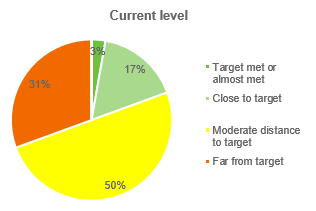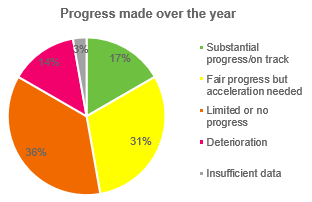The world isn’t doing enough
16 Sep 2020
It’s now impossible to attend a (virtual) conference or read the financial press without some form of reference to responsible investment. This is with very good reason. Considering a broad range of risks and opportunities beyond headline economic indicators is accepted as standard good practice. However, without radical change, our current and historic drain on the planet’s resources, and the way we interact with each other, will lead to irreversible impacts for future generations. A different future is now innevitable, but time is running out to shape this for the good.
In 2015, the 17 Sustainable Development Goals (“SDGs”) were the product of a global call to action from UN member states to improve the world, and the lives of people in it, by the year 2030. Each year, the UN reports on the progress being made relative to the goals globally. By most standards, the progress made to end 2019 (based on a range of 36 underlying indicators) represents a poor report card, as illustrated below:


The charts above show that we are well off delivering around 80% of the underlying indicators, and are not making sufficient progress to address this. Staggeringly, for more than half of the issues where we are off course, we have made either no progress or fallen backwards between 2018 and 2019.
Taking action
The issues requiring most attention include Goal 13: “Take urgent action to combat climate change and its impacts”, where we are “Far from target” and progress has deteriorated over the last 12 month. We should call out progress like this for what it is, “intolerable”. Global inaction means that radical changes in policy and regulation become more likely in future, creating greater uncertainty for companies and investors alike. Time is a precious resource that, in this case, is not on our side.
Individually, we can each do our best to preserve our planet and the people in it through our day to day actions, e.g. we can remove unnecessary travel, we can reduce consumption and we can recycle our waste. We should not, however, castigate ourselves for only taking one step at a time as long as each step we take is in the right direction. To have greater impact, we must increasingly hold those we interact with to account. As individuals and investors, we must challenge and then shun both organisations and political parties who fall short relative to the SDGs.
Institutional investors have significant leverage to influence change for good. We can drive better standards from the companies in which we invest and by reallocating capital in favour of those wishing to make, or are contributing to, progress. The latter does not need to come at a financial cost. It is through inaction that institutional investors stand to suffer a long-term cost, ultimately impacting on their beneficiaries.
Inaction from institutional investors will be subject to higher levels of public scrutiny in future, with plans to make reporting in line with the Taskforce for Climate-Related Financial Disclosures mandatory for the largest pension schemes.
To receive a more positive report card from the UN, we must all demand higher standards and use our influence to achieve them.
If you would like to know more, or have any questions, please don't hesitate to get in touch.


0 comments on this post